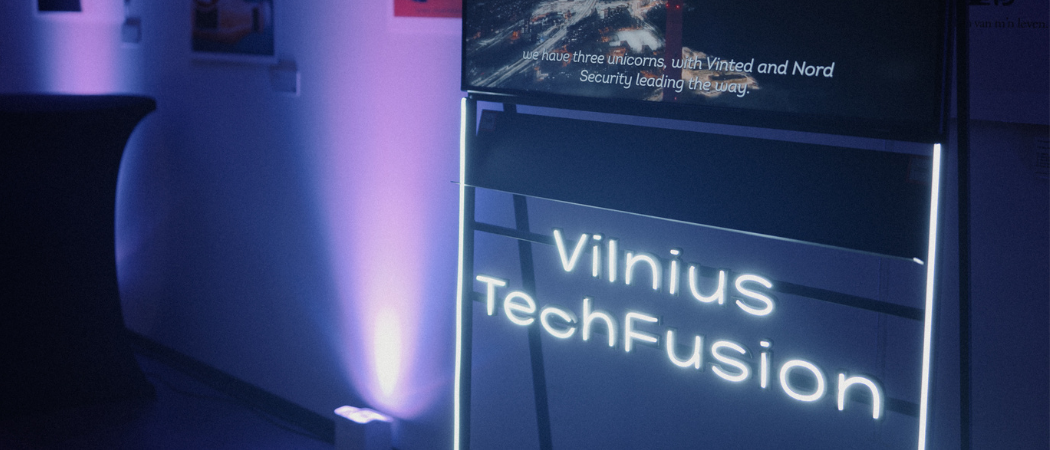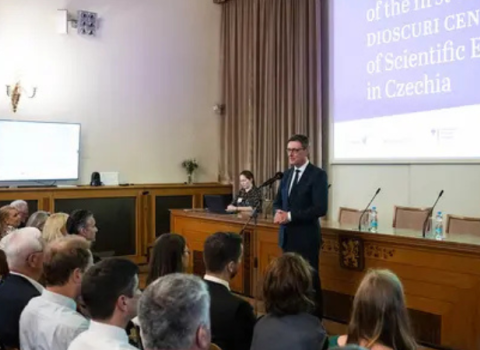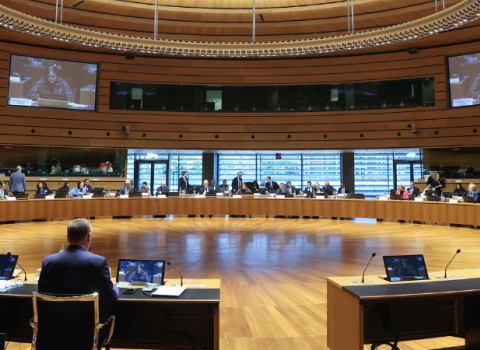More money and bigger markets are needed to consolidate Lithuania’s rapidly growing deep tech start-up ecosystem

Photo credits: Jauniskis / Go Vilnius
It is a cold, damp January evening in Vilnius. Even so, the city’s Contemporary Art Centre is buzzing. Free booze is flowing and at the door, staff welcome guests while turning away those without an invite. Inside, the speakers blare anthemic guitar riffs as the 200 or so guests, clad in a mix of plaid shirts, black skinny jeans and the occasional suit, filter into their seats. But this isn’t a gig, it’s a tech industry awards show.
The annual TechFusion awards show provides a snapshot of how Lithuania’s tech ecosystem has transformed over the past decade, the full hall testament to an ecosystem firmly in growth mode. The diversity of the winners is also telling: cybersecurity firm Nord Security, digital solar park designer PVcase, and enzyme designer Biomatter.
In 2014, Lithuania’s start-ups had a combined value of €419 million. Today that figure stands at €16 billion, an increase of more than 3,700%. This makes Lithuania the fastest-growing start-up ecosystem in central and eastern Europe, driven by tax incentives for new businesses and a growing pool of graduates heading into entrepreneurship.
Over 1,000 tech start-ups have sprung up in the country, collectively employing around 18,700 people. And with the country’s universities churning out a skilled technical workforce, supply is keeping up with demand.
Investment is also healthy. Major funding rounds last year included a €6.5 million seed funding round raised by Biomatter, a €6.7 million investment in blockchain start-up Vixichain, and a €3.2 million round for AI-powered drone company Unmanned Defense Systems. A growing number of local venture capital firms (VCs), targeting early-stage start-ups, are also helping build this momentum. The pace of change has been rapid, and from it, a new challenge has emerged. How will these start-ups reach the next stage of growth?
“That early-stage funding is critical, especially for deep tech and life sciences start-ups,” says Gintarė Verbickaitė, the chief executive of industry body Unicorns Lithuania. “But because of the smallness of our market, beyond Series A companies have to start looking outside for funding. Our local VCs try to help, and they have their own ways of attracting international investors, but it is still developing.”
Foreign funding
Lithuania’s ecosystem has just got to the point where it can provide private financial support, not just government funding, to deep tech start-ups, which often have longer, more capital-intensive timelines to commercial viability. However, those companies will need to look abroad to secure financing for future growth, says Jonė Vaitulevičiūtė, a managing partner at early-stage venture capital firm Firstpick. This could mean the ecosystem misses out on capturing further value from these companies.
“Here, we always say your first round should start with local investors because it’s easiest; you won’t have to compete with French or UK start-ups. But for your second or third round, you have to get international investors,” she says. “And their pipeline is so big. Our job is to have good relationships with foreign funds to send [opportunities to] and help start-ups raise.”
Given the relatively young VC landscape in Lithuania, funds tend to be smaller. Practica Capital, for example, closed the largest seed fund in the Baltic region in 2024 at a value of €80 million. By comparison, France’s AI darling Mistral raised $113 million in a single seed round just a few months before. It is hard to write the sort of large, competitive cheques needed to support the fastest deep tech innovation.
Still, constrained funding is not a new challenge for start-ups in Lithuania. Laurynas Karpus, the co-founder of Biomatter, says the company was able to get started in 2018 with limited resources thanks to Vilnius University and its surrounding partners, who make lab space available to start-ups at low cost.
“The jump from zero to one is especially difficult in a deep tech setting, where you suddenly need a full-scale laboratory to validate even the smallest things,” he says. “We were lucky to have the Vilnius University ecosystem to help kick-start the operations. As a business, we’ve aimed to work with partners and customers early on.”
For its next funding round, Biomatter will target “experienced partners that would share our vision,” likely beyond Lithuania’s borders. It already counts German VC fund UVC Partners and Inventure, a Scandinavian fund, as investors. “Our business is global, and there’s no reason to narrow our view when thinking about fundraising,” Karpus says.
HeavyFinance, a climate tech start-up that helps farmers switch to regenerative practices by providing loans and soil testing to measure carbon sequestration levels, says it will be targeting VCs in the US, UK, France and Germany for its Series A round.
“The Baltic start-up ecosystem offers sufficient capital for strong seed rounds, [but] securing Series A typically requires looking beyond the region. It’s not just about raising capital but also finding strategic partners who can support our growth,” says Laimonas Noreika, HeavyFinance’s co-founder and chief executive.
Beyond capital
Funding is not the only growth challenge Lithuanian start-ups need to navigate. Lithuania is a small country, so there are only so many people or businesses a company can sell its products to. Very specialist talent can also be hard to come by. Agronomists who can provide insights on how soil quality can be improved, for example, are in short supply. International expansion is a necessity for many companies, even at an early stage.
A unified start-up ecosystem across the continent, for example through the creation of an EU-wide legal status, could reduce some of these headaches, allowing start-ups to spend less time and money navigating differing legal, regulatory and employment frameworks when they try to expand abroad. HeavyFinance for one would benefit.
It currently operates in Lithuania, Poland and Ukraine; markets with large agricultural economies such as France, Germany, Spain and Romania are logical next destinations. “A more standardised framework would make scaling across Europe more efficient, allowing us to focus on growth and innovation rather than navigating fragmented regulatory systems,” says Noreika.
“The idea is amazing and it’s due,” says Verbickaitė. “For those who have bigger ambitions, having this set of rules and structures that don’t prevent that growth but can actually make it faster would be super important.”





 A unique international forum for public research organisations and companies to connect their external engagement with strategic interests around their R&D system.
A unique international forum for public research organisations and companies to connect their external engagement with strategic interests around their R&D system.